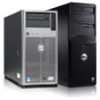Dell PowerEdge T605 Hardware Owner's Manual (PDF) - Page 210
EEPROM, expansion bus, expansion-card connector, Embedded server management.
 |
View all Dell PowerEdge T605 manuals
Add to My Manuals
Save this manual to your list of manuals |
Page 210 highlights
DMA - Direct memory access. A DMA channel allows certain types of data transfer between RAM and a device to bypass the processor. DMI - Desktop Management Interface. DMI enables the management of your system's software and hardware by collecting information about the system's components, such as the operating system, memory, peripherals, expansion cards, and asset tag. DNS - Domain Name System. A method of translating Internet domain names, such as www.dell.com, into IP addresses, such as 143.166.83.200. DRAM - Dynamic random-access memory. A system's RAM is usually made up entirely of DRAM chips. DVD - Digital versatile disc. ECC - Error checking and correction. EEPROM - Electronically erasable programmable read-only memory. EMC - Electromagnetic compatibility. EMI - Electromagnetic interference. ERA - Embedded remote access. ERA allows you to perform remote, or "out-ofband," server management on your network server using a remote access controller. ESD - Electrostatic discharge. ESM - Embedded server management. expansion bus - Your system contains an expansion bus that allows the processor to communicate with controllers for peripherals, such as NICs. expansion card - An add-in card, such as a NIC or SCSI adapter, that plugs into an expansion-card connector on the system board. An expansion card adds some specialized function to the system by providing an interface between the expansion bus and a peripheral. expansion-card connector - A connector on the system board or riser board for plugging in an expansion card. 210 Glossary















